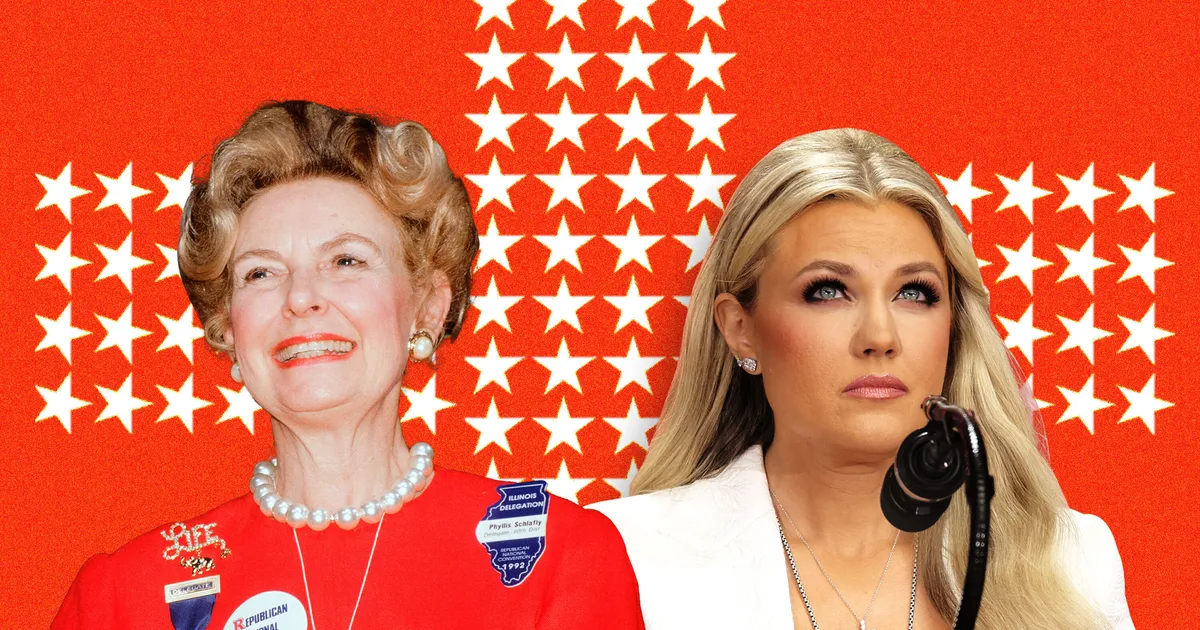
LOADINGERROR LOADING
In an April 2025 episode of “The Charlie Kirk Show,” Erika Kirk, the wife of the slain conservative pundit, gave her thoughts on submission and the role of a woman in a “Biblical marriage.”
“Your husband has to be the one that goes out into the world and builds and battles and comes home. Conquers,” she said as Charlie Kirk sat next to her. “[He] comes home and is like, this is my nest egg, this is what I worked so hard for, and the wife is like, ‘Welcome home, babe, whatever you need, we’re here.’”
Advertisement
There are occasions when a man has to step in and stay at home ― Erika Kirk admitted that her own father did so briefly and that it was a “really sweet and really special” time in her childhood. Still, she said, her parents divorced, which proved her point: Generally, a marriage is stronger when the man is the provider.
Now, Erika Kirk is foisted into the provider role. A week after Charlie Kirk was gunned down during a speaking event at a Utah campus, Erika Kirk was announced as the CEO and chair of the board for his company, Turning Point USA.
The board “unanimously elected” Erika Kirk, explaining that “in prior discussions, Charlie expressed to multiple executives that this is what he wanted in the event of his death.”
Advertisement
In a speech days after his death, Erika Kirk spoke directly to her husband’s murderer: “You have no idea the fire that you have ignited within this wife.”
On this week’s episode of “The Charlie Kirk Show” this week, the mom of two smiled and assured the couple’s legions of fans that her “husband’s voice will live on. The show will go on.”
Advertisement
But some may wonder: How will Erika Kirk, 36, reconcile her new role as CEO of his super PAC with the messaging she’s promoted at her late husband’s side ― that women are meant to be “the guardian of your home” and shouldn’t pursue their own careers while raising children?
For conservatives, the contradiction goes down easy: From the anti-suffrage era to modern politics, women have long played an instrumental role in the conservative movement, through a loophole: Having it all ― a political career and a tradwife life ― is possible, but only with the blessing of your husband or your father.
In Erika Kirk’s case, she’s continuing his career, not taking hers to new heights.
“Conservative women claiming not to be career women while being in the public eye in politics or business is nothing new,” said Shauna Shames, an associate professor of political science and women’s studies at Rutgers University–Camden in New Jersey.
Advertisement
“Erika Kirk is a modern incarnation but not different in kind to [gay rights opponent] Anita Bryant, televangelist Tammy Faye Bakker and certainly Phyllis Schlafly.”
Erika Kirk and tradwife influencers owe a lot to one woman: Phyllis Schlafly.
Perhaps no one has pulled off this public balancing act with as much dexterity as Phyllis Schlafly. The conservative activist enjoyed a thriving, decades-long career in politics ― she famously led a successful campaign against the ratification of the Equal Rights Amendment in the 1970s ― while reminding the women of America that security and home and hearth was preferable to a job and equality.
A mom of six ― and wife to Fred Schlafly, a lawyer ― Schlafly argued that it was possible to balance submission at home with a certain kind of political advocacy: letter-writing campaigns, speaking before women’s clubs, debating feminists (and in some cases, rattling them) while framing oneself as the voice of the “traditional” American woman.
Advertisement
In a 1978 profile in Time magazine, Schlafly spoke of how she squared her career ― a law degree, two runs for Congress ― with her stay-at-home rhetoric: “My husband lets me do what I want to do,” she said. “I have canceled speeches whenever my husband thought that I had been away from home too much.”
In speeches, Schlafly joked about her balancing act and wifely subservience irking her opponents. “First of all, I want to thank my husband Fred, for letting me come — I always like to say that, because it makes the libs so mad!” she’s quoted as saying.
Advertisement
In many ways, Erika Kirk is the Schlafly mold: They’re both highly educated. While Charlie Kirk argued that college “is a waste of time” to an audience at the Turning Point Action’s Young Women’s Leadership Summit in August, his wife holds a master’s degree in American legal studies from Liberty University, and is currently pursuing a doctorate in biblical studies, according to her website.
Since having two kids, she’s continued to host a podcast and run a Christian clothing line and ministry.
But “boss babe culture” is “toxic,” Erika Kirk told the couple’s fans at the same summit in 2021.
“When you meet the right man, everything shifts, everything changes. When I met Charlie, that was it. I could care less about the career,” she said at the summit this summer. “Motherhood is not a pause — it’s a launchpad.”
Advertisement
For conservatives, there’s no contradiction in Erika Kirk’s dual roles.
Those flocking to Erika Kirk ― like those who flocked to Phyllis Schlafly in the ’70s and ’80s ― don’t see anything hypocritical in any of this, said Donald Critchlow, a professor of history at Arizona State University and the author of “Phyllis Schlafly and Grassroots Conservatism: A Woman’s Crusade.”
“Kirk and Schlafly believe women’s primary obligations should be to their families and children, while being civically engaged,” he told HuffPost. “Involvement in school boards, for instance, charities, temperance, abolitionism, and a full range of other activities.”
As Critchlow sees it, the separation between family, work outside the home, and civic engagement are “false dichotomies created by second-wave and postmodern feminism.”
Advertisement
Amy Binder, an SNF Agora Institute professor of sociology at Johns Hopkins University, sees the contradiction. But for conservatives, having dual roles is not as paradoxical or ideologically inconsistent as progressives might think.
“Kirk’s role as career woman is less of a contradiction because it is in service to traditional gender norms, encouraging women to be wives and mothers first,” the professor told HuffPost. “Where liberals might see contradiction in career vs. family, I suspect that Erika Kirk’s followers see womanly devotion.”
Advertisement
“All in all, I’ve found that conservative women believe they are advocating optionality for women, whereas liberal feminists devalue all options except career and are trying to make women more like men, which is against their essential nature,” said Binder, the author of “The Channels of Student Activism: How the Left and Right Are Winning (and Losing) in Campus Politics Today.”
Popular podcasters like Christian conservative Allie Beth Stuckey and tradwife influencers are reaching apolitical audiences with that exact message.
The idea that women “need to be liberated” and “go into the workforce,” rather than stay at home and have kids, “has actually led to a lot more misery than freedom,” Stuckey told the Atlantic magazine in a 2024 profile where they dubbed her “the new Phyllis Schlafly.”
Advertisement
In Washington, D.C., Republican senators like Katie Britt (Ala.) and Supreme Court Justice Amy Coney Barrett do it all, too ― granted, probably with a lot of child care help than the average mom.
Last year, White House press secretary Karoline Leavitt returned to work just four days after giving birth when Trump announced his candidacy. “I would reject that you can’t be a good mom and be good at your job,” Leavitt said on a recent podcast. “It’s not for everybody. And it takes a lot of work and will and faith and prayer, and it’s hard. But it can be done.”
The economics of staying it home or “having it all” are almost impossible, unless you’re wealthy.
What these women don’t dwell on is how limited your options are if you’re not a multimillionaire podcaster or a member of the political elite.
Advertisement
Though both Democratic and Republican parents (86% and 88%) say that being a parent is either one of the most important or the most important aspect of their identity, few have the luxury of having one parent stay at home. According to a Pew Research Center report on parenting in America today, nearly as many Republican mothers (67%) work outside the home as Democratic mothers (70%).
“We all face the simple economic truth that few families or even couples can afford to live fully on just one person’s salary anymore,” Shames said. “Women’s labor force participation has gone up, up, up, although they tend not to work as many hours as men, and still get paid a lot less, though often because of job segregation rather than direct discrimination.”
Advertisement
There are real grievances both men and women have today about current economic, social and political conditions around parenting: The cost of child care continues to rise, with the average cost of a week of day care going up 13% between 2022 and 2024, for instance. Families today are spending an average of 24% of their income on child care — that’s more than triple the 7% the Department of Health and Human Services considers affordable.
Still, Shames said, none of that is the fault of feminism.
“Feminism is a convenient scapegoat for anger about deep structures that are hard to see and name, chiefly globalization, democratic erosion, exploitative capitalism with disappearing social safety nets.”
Will today’s conservative women bring in the “end of feminism”? Probably not.
Advertisement
20 Years OfFreeJournalism
Your SupportFuelsOur Mission
Your SupportFuelsOur Mission
For two decades, HuffPost has been fearless, unflinching, and relentless in pursuit of the truth. Support our mission to keep us around for the next 20 — we can’t do this without you.
We remain committed to providing you with the unflinching, fact-based journalism everyone deserves.
Thank you again for your support along the way. We’re truly grateful for readers like you! Your initial support helped get us here and bolstered our newsroom, which kept us strong during uncertain times. Now as we continue, we need your help more than ever. We hope you will join us once again.
We remain committed to providing you with the unflinching, fact-based journalism everyone deserves.
Thank you again for your support along the way. We’re truly grateful for readers like you! Your initial support helped get us here and bolstered our newsroom, which kept us strong during uncertain times. Now as we continue, we need your help more than ever. We hope you will join us once again.
Support HuffPost
Already contributed? Log in to hide these messages.
And feminism is probably here to stay. Ever since it’s existed, people have been claiming to kill it, Shames said.
Advertisement
“Schlafly did not ‘end feminism,’ nor will Erika Kirk,” the professor said. “All of it, I think, actually emphasizes the power of feminism and the continuing challenges we face.”
“In fact, we’re at what is probably a high point of feminism historically, with more women in the world having more choices than ever before in terms of how to structure their own lives and pursue their own dreams,” she said.



